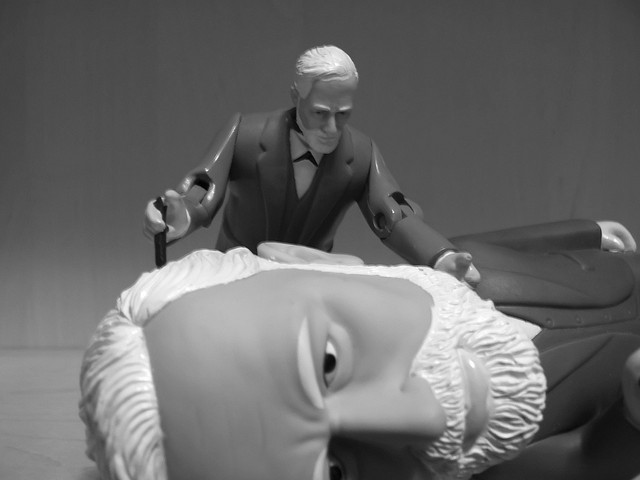Yes, you read that right.
The world perceives therapists in two ways in my experience: crazy, or, someone who has their sh*t together. These two should not be mutually exclusive when you step into someone’s office.
They should be both crazy and have their sh*t together, if they will be able to assist you at all.
While I was in an addictions class in graduate school, I sat in a room with 18 other psychotherapists and half of them had never even been exposed to an alcoholic. Note: I was in an addictions class.
Being naïve in the opposite sense of traditional naïvety, my life has been as such that I somewhat assumed that everyone had at least known or come from an alcoholic.
Finding out that this wasn’t the case left me salty about being lumped into a category of professionals who were about to engage with the world in the same way I was. I didn’t want the world’s perceptions of the people in my field to be the same they’d have of me.
I knew a piece of paper wasn’t going to truly afford us the privilege of healing someone who experiences things we’ve only read about in a text book.
Healing is a process and it starts first, with ourselves. Healing will never be learned—it will always, and only be, known.
I threw up my worldly notions of professionalism that day. I quit graduate school for an entire year to pursue a life coaching certification based on that afternoon.
Wanting to be as effective as possible in the world, I finished my master’s degree just to have an MA behind my name so the world would think I was legit in assisting people on their sacred journeys.
That piece of paper didn’t give me the credentials to do what I do, my life did.
My favorite professor used me as an example of “the wounded healer heals best,” on a consistent basis, as if there was some supremacy in resilience.
I absolutely believe people who haven’t experienced the things in the world that others have can heal others, if they have the tendencies to go to the dark places in their minds the world has forced others to go in their lives.
In this sense, one must first be f%*ked up and then practice the art of self healing. If this were not true, how could they know innately how to facilitate the healing of others?
Healing is a life long practice. It is never complete and it isn’t a ball you can easily let drop without feeling the sting of it smashing your toes into the ground. When you end the practice of healing, often it hurts. A healer knows this and they first and always practice on themselves.
Statistically, I’ve heard that mental health professionals have the highest percentage of mental illness in a given profession. “Illness” is arbitrary to some degree in the mental field.
Psychiatry is also the only medical field that doesn’t actually assess the organ it studies through medical testing (typically anyway). A majority of these practices: medical, medicinal, and energetic, are based on trial and error. Usually, the effects of trial and error fall into the minds of people other than the clinician.
It takes someone who has been in the trenches of their own agony, grief, guilt, shame, angst and neurosis, who has left it all in the ashes of its fiery hell, to rise again as the phoenix does.
This same person who, burned up with patterns that held them together, is now flying high with the transformed wings of the phoenix. She isn’t immune to the wind blowing and kicking up the ashes, which impair vision on the flight to transcendence—her ashes will always float with the rest of the particles in the breeze that she flies through, but she no longer burns with them on the ground.
She knows her ashes, and she is vigilant about taming them. She practices first, on herself. In order to continue practicing clarity and healing, she must always remain aware of her own crazy.
She knows the process not because she’s been there before, but because she’s in it now, and commits to being in it, always. She’s not testing a pill on a brain that’s not hers in hopes that it’s healing for another. She’s not reading rote material from a text that seemed to work for a million people with the same disorder, unless she herself has tested, tried, and practiced the method that she facilitates.
Her own healing is what people are drawn to. Her vulnerability, her rawness, her human-ness emanating out doses of sweet Spirit.
Believing that a piece of paper qualifies someone to heal, may be the craziest notion of all.
I have also known people to feel American shame for living a luxurious life and then manifested eating disorders, or nervous tics, just to fit into what the world classifies as resilient. As if resilience is the power we’re striving for in hopes of saying, “Look, I’m f%*ked up too!”
That too, is f%*ked up in its own right.
My point is, a wounded healer may heal best, but everyone is wounded. There is someone out there who bleeds the same wounds that you do.
That person is the one you should find. That person who feels you, knows you, gets you, because they are you. She is the person who sees your journey as parallel to hers and is more diligent in her own healing than yours, so she can hold your hand with each step you take, reminding you that healing isn’t a job, it’s a birth right.
You can hop on the healing train, or not, but she’s on it.
If we get to work with her, we all know it’s only because she’s just a little bit more f*%ked up than we are, but she’s working it out with grace and making the journey seem worthwhile. We want a piece of that grace.
How could we ever learn from someone who has not first learned herself, for the benefit of all of her students…and her teachers.
Find your person, not your therapist.
Relephant:
How a Therapist Saved My Life.
~
Author: Stacy Hoch
Editor: Travis May
Photo: Flickr/Enrico



Read 2 comments and reply